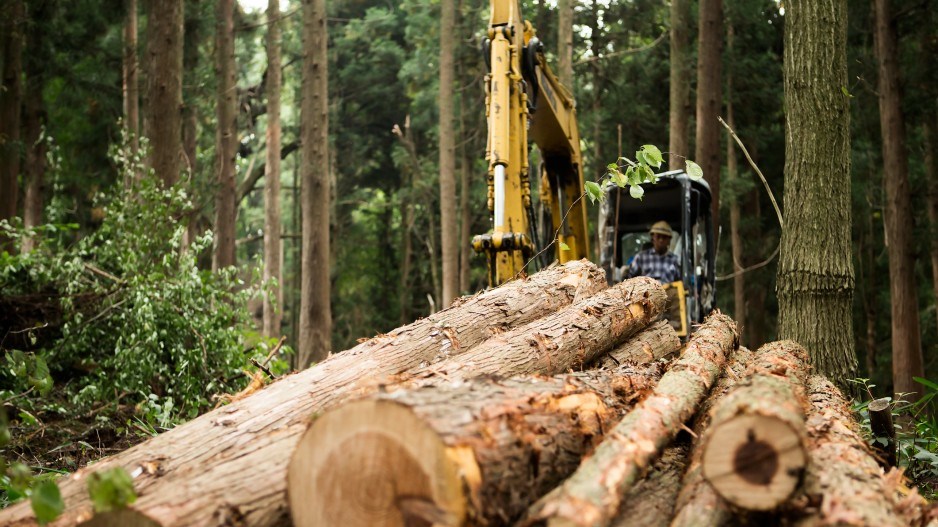B.C.’s forestry industry is shrinking both in scale and importance to B.C.’s overall economy, with the biggest impacts of sawmill and pulp mill curtailments and closures felt in smaller cities and towns, according to an economics analysis by Central 1 Economics.
“B.C.’s forestry-dependent communities have experienced a flurry of damaging news this year as the combination of market forces and impacts of longer-term forces affecting timber availability have triggered yet another cascade of mill closures,” says Bryan Yu, chief economist for Central 1 Credit Union.
Yu notes that, in less than two months, Western Forest Products (TSX:WEF) announced that a temporary curtailment of its Port Alberni sawmill would become permanent, and Canfor (TSX:CFP) announced it is shutting down its Chetwynd sawmill and pellet mill, and shutting down its Prince George kraft pulp line and Houston sawmill, although the latter site has been identified for a redevelopment at some future date.
“Meanwhile other companies have announced extension of temporary curtailments due to weak market conditions,” Yu’s report notes.
Yu estimates the sawmill and pulp mill closures announced just in the last couple of months represents 850 lost jobs:
- Port Alberni, 100;
- Chetwynd, 150;
- Prince George, 300;
- Houston, 300
Yu expects there may be more curtailments in 2023, thanks to a weakening demand for lumber in the housing sector.
“In Canada, we’ve done relatively well for housing starts in 2022, but I would suggest that that’s going to pull down in 2023, just as a result of the weaker housing market,” Yu told BIV News. “I wouldn’t be surprised to see further curbing of activity.
“I know that the government is looking to support the sector – either creating incentives to repurpose some of these mills, do some more value-added -- but that’s going to be more of a difficult transition for the sector. You can’t really just replace some of these forestry jobs that easily.”
B.C.’s forest industry has been in decline for years now, in tandem with a shrinking timber supply. While wood and pulp products are still some of B.C.’s most valuable export commodities, forestry is a smaller share of the economy now than it was 20 years ago, Yu notes in his analysis.
In the early 2000s, logging and wood product manufacturing (sawmilling, pulp mills, etc.) made up about five per cent of B.C.’s GDP, and employed 90,000 people, Yu estimates. Today, it employs 47,665 and represents only 1.9 per cent of B.C.’s GDP. About 17,300 of those 47,665 jobs are in logging -- about 36 per cent.
When there is a downtown – as there always is in resource industries, which are by nature cyclical – the overall impact on the B.C. economy overall isn’t as significant now as it was 20 years ago.
“While market-driven, the latest closures highlight the longer-term trend in B.C. of a shrinking forestry sector in both size and relative importance for the economy,” Yu’s report notes. “Even a more pronounced downturn will have relatively modest impacts on B.C. economic growth and employment.”
However, downturns that result in curtailments and mill closures have a significant impact on the local economies of forestry dependent towns and cities.
“In some cases, these jobs could represent 10 per cent of the overall population,” Yu told BIV News.
When a smaller town suffers that many job losses, it can have a domino affect that hollows out the local economy.
“Locally, long-term weakness in B.C.’s forestry sector could be devastating for smaller communities reliant on the forestry sector as mill shutdowns impact both the direct high paying manufacturing and forestry jobs, but also indirectly impact the local communities through demand for goods and services,” Yu warns in his analysis.
“For example, a community like Houston is home to 3,200 persons, while Chetwynd’s population is 2,650 persons. Job losses of this magnitude could be devastating as they could represent up to 300 workers and 150 households and be among the largest employers in the towns.
“While the job market remains exceptionally tight in the province, there could be repercussions from closures of major employers including broader business closures, home loan delinquencies, bankruptcies, a weaker local tax base, and outmigration to other areas.”
Workers with transferable skills may find temporary jobs in other resource sectors – like oil and gas or mining – or on big energy mega-projects, like pipelines or Site C dam. Workers laid off at a sawmill or pulp mill may be able to remain in their communities and work on other projects, which are often fly-in, fly-out.
But by 2025, most of those big energy projects will complete or winding down, and those jobs will start drying up as well.
“My concern would be around when we think about 2025,” Yu said. “There’s no major projects replacing those, once those complete.”



